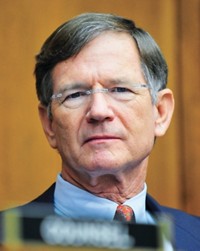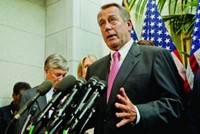Advertisement
Grab your lab coat. Let's get started
Welcome!
Welcome!
Create an account below to get 6 C&EN articles per month, receive newsletters and more - all free.
It seems this is your first time logging in online. Please enter the following information to continue.
As an ACS member you automatically get access to this site. All we need is few more details to create your reading experience.
Not you? Sign in with a different account.
Not you? Sign in with a different account.
ERROR 1
ERROR 1
ERROR 2
ERROR 2
ERROR 2
ERROR 2
ERROR 2
Password and Confirm password must match.
If you have an ACS member number, please enter it here so we can link this account to your membership. (optional)
ERROR 2
ACS values your privacy. By submitting your information, you are gaining access to C&EN and subscribing to our weekly newsletter. We use the information you provide to make your reading experience better, and we will never sell your data to third party members.
Environment
Administration Policies Are Panned
Budgets, scientific integrity, and energy policy are criticized by science policy experts at AAAS forum
by David J. Hanson
May 8, 2006
| A version of this story appeared in
Volume 84, Issue 19
Declining federal funding, political interference with science, and government inaction on the issue of global climate change were areas where the Bush Administration was battered by science policy leaders at last month's Forum on Science & Technology Policy presented by the American Association for the Advancement of Science (AAAS).
This annual conference in Washington, D.C., draws hundreds of policy wonks seeking the latest word on the directions that Congress and the White House may be taking science. But instead of the mostly polite discussions that regularly mark this event, a number of the forum's speakers showed rising discontent with the direction the Administration is heading.
The federal budget was a recurrent theme at the meeting, because government spending is a principal means for shaping science and technology policy. The budget proposal for fiscal-year (FY) 2007 sends a mixed message about government research support, and President George W. Bush's own science adviser described the research and development funds in the budget in far less than glowing terms.
"The President's FY 2007 budget does not increase overall nondefense discretionary budget authority, and the request for nondefense research and development is proposed to increase at a rate slightly less than inflation," said John H. Marburger III, Bush's science adviser and director of the White House Office of Science & Technology Policy. He also described a history of science policy events that he sees as having led to the situation as it is today.
On the positive side, Marburger talked mostly about the American Competitiveness Initiative (ACI), proposed by Bush during his January State of the Union address. This program would provide a $910 million increase in funding for physical sciences at the National Science Foundation (NSF), the Office of Science at the Department of Energy (DOE), and the laboratory programs at the National Institute of Standards & Technology (NIST). Marburger indicated that prioritizing research spending in this way is necessary during times of budget constraints.
These statements were echoed by Energy Secretary Samuel W. Bodman in a luncheon address to the forum. Bodman described the programs at DOE that will be funded under ACI, including the International Thermonuclear Experimental Reactor (ITER), the Spallation Neutron Source at Oak Ridge National Laboratory, and a big increase for further development of supercomputers. Noting that life sciences research did not get the increased funding that physical sciences did in the President's proposal, Bodman said: "I hope you agree it is time for the physical sciences to start catching up with some of the gains that the life sciences sector has achieved over the past 10 years." To the regret of some attendees at the meeting, Bodman did not address the more controversial issues of climate change, excessive congressional earmarks, or cuts to other parts of the DOE budget.
Other budget analysts at the AAAS meeting emphasized that understanding the poor performance of the overall R&D budget requires a grasp of the problems facing the entire budget. Kei Koizumi, the director of the R&D Budget & Policy Program at AAAS, said the record federal deficits over the past three years have resulted in fierce competition for funds during the congressional appropriations process and that, during such times, cuts can be expected in science programs.
"The past few years have seen flat or declining funding" for most research agencies, Koizumi said. Aside from the three agencies in ACI, most other R&D programs will receive cuts in the future. "Our projections of future budgets have turned out to be remarkably accurate," he said, and the data show that most agencies can expect cuts between 10 to 30% by FY 2011.
Even the funding increases under ACI are uncertain. G. William Hoagland, director of budget and appropriations in the office of Senate Majority Leader Bill Frist (R-Tenn.) said this is going to be an extremely difficult political year. Congress is still working on spending and tax reconciliation bills for the FY 2006 budget, and the Senate and House may be hopelessly deadlocked over spending and tax problems, Hoagland says.
In light of these problems, "it is unlikely that the proposed increases for DOE, NIST, and NSF will be realized," Hoagland told forum attendees. "Failure to do something to change the entitlement ethos in this country, especially for health care," will keep R&D budgets from rising.
Another problem arising from Congress' stalemate is the extension and possible increase of the R&D tax credit for corporations. This 20% credit for domestic research has never been made permanent. It has been removed from this year's tax reconciliation bill and will not be put back in, Hoagland said. To be extended, the R&D credit will have to be proposed as freestanding legislation, he noted, where there is greater risk that it will not pass.
The other major research proposal made by Bush this year was the Advanced Energy Initiative, which is supposed to increase U.S. fuel supplies and decrease the nation's dependence on imported oil. Speakers at the forum, however, had few kind things to say about the President's energy policies to date, mostly due to the consistent refusal to address global climate change.
John P. Holdren, professor of environmental policy at Harvard University and director of the Woods Hole Research Center, told forum attendees that "climate change is the most dangerous of all human impacts on the environment, because climate is the envelope within which all other environmental conditions and processes operate." He explained that creating an energy policy for the U.S. is very difficult because the various goals are often in tension with each other. Environmental aims, for example, can conflict with economic or national security goals. The challenge, then, is to create the best compromise between these competing goals and "to promote technological advances that reduce the tensions among the policy objectives," Holdren said.
But the Administration does not seem to be doing a very good job of supporting research to create these technological advances, according to Kelly Sims Gallagher of the Energy Technology Innovation Project at Harvard's Kennedy School of Government. Her analysis finds that the R&D increases proposed for the FY 2007 budget are ambiguous at best, and that "the total U.S. investment in energy research, development, and deployment is rather small in relation to the looming energy-related challenges facing the nation."
Gallagher said the 22% increase in clean-energy research that Bush noted in his State of the Union address in January is virtually impossible to find. Her analysis of DOE R&D on clean-energy technologies mentioned by the President in his speech finds only a 15% increase in proposed spending. And, in many areas, she said, the budget proposal increase seems to have been made at the expense of other energy programs. For example, there are proposed decreases for automobile-efficiency research and cuts for energy-efficient technologies such as building weatherization, and federal funding would be canceled for geothermal, hydropower, petroleum, and natural gas research.
But climate change was the real focus of the energy session. Holdren cited a number of government-sponsored reports from the past 10 years that have called for greater investment in energy R&D and greenhouse gas mitigation programs upon which there has been no action. Gallagher noted that carbon dioxide sequestration to reduce concentrations of CO2 in the atmosphere is only slated for $73 million in funding for FY 2007, a figure that is "far too low," she said.
Joseph Romm, founder and executive director of the Center for Energy &anp; Climate Solutions, in Arlington, Va., took the most outspoken view, stating that the government's "energy and climate policy is immoral." Romm strongly holds that climate change is reaching a crisis point and that the only thing that matters now is reducing the amount of carbon in the atmosphere. Federal support for programs that would increase fossil fuel use, especially extracting oil from tar sands and shale, and even hydrogen fuels, only make the problem worse, he said. Romm told forum attendees that it is the government that must make the hard decisions on cutting greenhouse gas emissions and force industry to follow, because industry will not change on its own.
Government shortcomings were not the only topics at the forum. Scientists' own practices came under scrutiny at a discussion on protecting the integrity of science. Nicholas H. Steneck, professor of history at the University of Michigan, told meeting participants of his research into the scientific misconduct of researchers themselves and warned that greater concern for this problem is needed.
Although the most serious misconduct, such as outright fabrication and falsification of results and plagiarism, occurs only infrequently, other behaviors by researchers are also troubling, Steneck said. He cited problems of financial mismanagement, failure to maintain confidentiality, failure to report all or conflicting data, using ideas without credit, and deceptive data interpretation as behaviors that are more common forms of misconduct. And although some studies by scientific organizations have brushed off such behaviors as not doing any damage to science or having minimal consequences, Steneck argues that, in the long run, "the impact of these questionable practices is actually more damaging than the outright falsification, fabrication, and plagiarism." In conclusion, he warned: "If the scientific establishment doesn't adopt stronger management of its own activities, then you'll get stronger government regulations."
The Bush Administration came under heavy criticism as well for actions that presenters believe impinge on the integrity of science, particularly as it relates to peer review. Three problems over the past few years stand out, according to Felice J. Levine, executive director of the American Education Research Association. Levine noted the rule by the White House Office of Management & Budget that would radically change peer review procedures for the federal government, the continuing congressional actions to halt funding of peer-reviewed research on the basis of political reasons, and the political interference in the selection of scientific advisory committee members.
Other political challenges to science were noted. "Expert panels have been disregarded, as in the recent Food & Drug Administration commissioner's decision to overrule its expert scientific panel regarding the safety of providing the morning-after pill over the counter by postponing indefinitely a decision," Levine said. There also have been "efforts to silence scientists at the National Oceanic & Atmospheric Administration and the National Aeronautics & Space Administration from discussing or presenting findings regarding the growing intensity and impact of global climate change."
Levine noted that the raised voices of scientific organizations in protest have been effective in getting these situations out into public view. She believes, however, that government attacks on sound scientific research through peer review will continue.









Join the conversation
Contact the reporter
Submit a Letter to the Editor for publication
Engage with us on Twitter